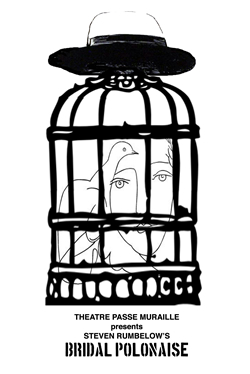
Bridal Polonaise
Written and Directed by Steven Rumbelow
Triple action was in Poland performing for Solidarity and for Grotowski's Laboratorium when their leading actress, Carole Pluckrose came down with Cholera. At that time there was a Cholera epidemic in the north of the country and a Typhus epidemic in the south. The Russians were trying to starve out Solidarity and the result was Poland's medical supplies, food stores and munitions were completely depleted. This was a continuation of the abuse they'd suffered for 500 years as the "disputed bride of Europe" being tossed around by neighbors who would trade off. They were even betrayed by their own country when Poland took on a foreign King 500 years previously.
The medics came into Carole's hotel room, took one look at her, tossed handfuls of sulphur pills on the bed and said, "Take 10 every hour. Get her to a Western hospital, now!" and they left. The company drove straight through to get her to a hospital. They luckily made it and saved Carole but they found out quickly how close they were to not having made it out. When they tried to get back into the country, martial law had been declared and they were told that they would not be permitted back into the country for any reason because they had worked for Solidarity and been vocal for support of artists in the country for many years. It was also known that they had smuggled everything from political letters to people in trouble out of the country over the years.
If Triple Action couldn't go to Poland, then Steven decided he would bring Poland to them. He wrote a play that expressed the Polish condition with Polish actors in Polish performance styles, abstractions and traditions. The production took place in a promenade theatre environment that took people from a tacky Polish wedding in Chicago back to the Nazi occupation of Poland through the Russian occupation right up to the modern day black market chaos of 1985. The experience was emotional for everyone, deeply passionate for the actors and audiences a like. Chicago had the largest Polish population in North America at that time and the audience would sing along with the traditional Polish songs and collapse in tears during the more emotional parts. Many in the audience prayed along with the characters and wept as a white dove would fly down and drink from 80 gallons of "Polish blood" that flooded the stage to metaphorically clean the past. The production sold out in Chicago for three straight months. It did much the same in Toronto at Theatre Passe Muraille.
Triple Action returned to a new and "free" Poland in the early nineties. The theatre had changed. The removal of censorship had taken away the need for the actors to perform in ambiguous symbols but the character was still there and remains to this day.
Review Archive
- Dr. Faustus
- King Lear
- Ulysses
- Moby Dick
- Bridal Polonaise
- Yes
- Solaris
- Richard III
- Other Notable Productions





